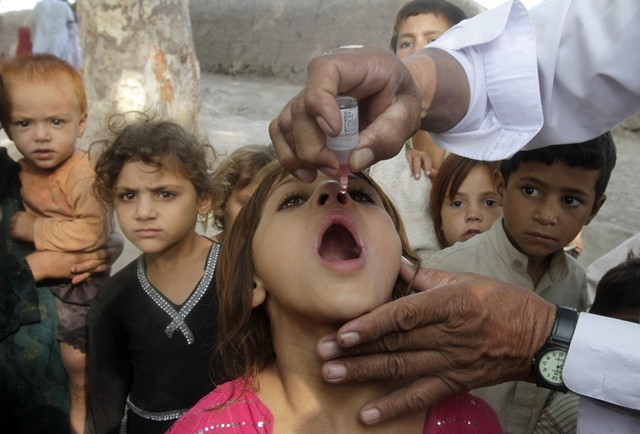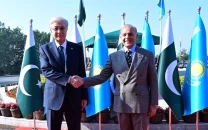Combating crippling disease: Provinces’ non-seriousness a major hurdle
A nation-wide drive to begin from September 29 till October 1

The problems being faced by the government echoed at the prime minister’s Polio Monitoring Cell meeting on Thursday.
A senior official, on condition of anonymity, told The Express Tribune that the non-seriousness of the authorities towards the issue could be gauged from the fact that only Gilgit-Baltistan’s health minister and Punjab’s health secretary turned up at the high-level meeting.
The health ministers from other provinces were represented by senior officials at the meeting.
“It was an important meeting as a roadmap to eradicate polio was to be decided. The ministers were supposed to be at the meeting to discuss a plan for low transmission season and a way to deal with the IDPs settled across the country. But seemingly polio is not a matter of priority for them [health ministers],” the official said.
When contacted, Ayesha Raza Farooq, the PM’s focal person at the polio cell said, “The federal government and premier’s polio cell has played its part by inviting provincial health ministers to discuss this important issue but they didn’t turn up”.
It is now their responsibility to show commitment to the cause, she added.
Sharing details of the meeting she said discussions were held on various issues and provinces have been asked to come up with a road map to address the issue in their respective areas mainly by improving the quality of anti-polio drives.
She added that the health officials have been asked to use the term ‘security compromised areas’ for places that are inaccessible for the polio teams due to security reasons.
Commenting on the surge in the number of polio cases the focal person said, “Though there has been an increase in the number of polio cases as compared to previous years but still, I do not consider it as a failure of the Polio Eradication Plan.”
National Manager of the Expanded Programme on Immunisation (EPI) Dr Rana Safdar confirmed to The Express Tribune that accessibility to 12 union councils (UCs) have become a serious challenge for Pakistan. They have turned into high risk zone in terms of polio transmission, he added.
He explained that the UCs, mainly situated in tribal areas and Karachi, have become a serious challenge for the country.
“Though we had high hopes after the military operation, Zarb-e-Azb began in North Waziristan Agency. We believed it would help us gain access to the 250,000 children who have not been inoculated since 2012. But things have not turned out how we expected it to be."
He added that recently it had come to their notice that a lot of people who have not left North Waziristan are still inaccessible.
Anti-polio drive
Dr Safdar further said that as per the National Emergency Action Plan 2014 for Polio Eradication, Short Interval Additional Dose Strategy for polio, an anti-polio drive covering 25 per cent of the population is scheduled to commence from September 29 till October 1 across the county.
“In view of recent upsurge in cases, it is to be now conducted as National Immunisation Days covering over 34 million children,” he said.
He was of the view that it is a time to focus more on the quality of anti-polio campaigns rather than on their quantity.
Published in The Express Tribune, September 26th, 2014.



















COMMENTS
Comments are moderated and generally will be posted if they are on-topic and not abusive.
For more information, please see our Comments FAQ